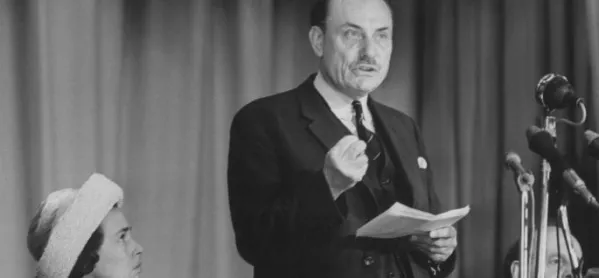- Home
- ‘Ethnic minority students must learn to face prejudice’
‘Ethnic minority students must learn to face prejudice’

The recent anniversary of Enoch Powell’s “Rivers of Blood” speech led to the controversial reading of his complete speech on BBC Radio 4. This was the first time it has been broadcast in its entirety.
At first BBC’s Amol Rajan promoted this as a great media event, but after facing backlash from civil and human rights organisations, he acknowledged the potential distress the reading of the whole speech could cause and clarified the format of the programme. Amol is a champion of ethnic minority rights and I have seen first-hand how he, as a person belonging to an ethnic minority himself, from a working-class background, smashed the glass ceiling by becoming first non-white editor of a mainstream newspaper. Today he continues to mentor and inspire the next generation of journalists from harder-to-reach and underrepresented communities.
Sometimes the power of words can impact and affect individuals in many ways - by opening unhealed wounds brought about from persistent hate speech in the face of the recent rise in hate crime. In my opinion, I think Amol got it right in the end - that it is important we remember the speeches and sentiment; in particular, those ideas that are racist and hate-driven promoted by members of our past establishment, that have shaped the society we live in today. But this should never happen at the cost of forgetting the pain and suffering caused while reflecting on how we should never allow this to happen again.
Racism and prejudice
This was evident when the Naz Legacy Foundation recently arranged for 70 young diverse students from mainly deprived communities to attend our special diversity day, which included a tour of the First Waves Exhibition that celebrates the introduction of the first Race Relations Acts in Parliament 50 years ago. The students were given a personal tour by the Speaker’s Advisory Committee’s own works of art appointee, Scarlett Crawford, and she explained the impact that the Acts had on minority communities and the different aspirational role models whom they could identify with.
After walking down Downing Street and taking selfies outside the famous black doors, they had a chance to question three inspirational MPs, Nusrat Ghani - the first Muslim women minister to speak at the Commons despatch-box; Dawn Butler - the first elected Afro-Caribbean female minister; and Jo Swinson, who was elected as the youngest MP of her intake.
But what impacted the students more was attending home secretary Sajid Javid’s Commons Questions. Having a Muslim from a working-class background as the home secretary no doubt raised the aspirations of the students. However, when an opposition MP said he “sounds like Enoch Powell”, it affected the students the most.
That insult created the biggest discussion amongst the students. Despite the majority of the young people expressing their support for Labour, they found having someone from an ethnic minority compared to the infamous “Rivers of Blood” Powell extremely offensive. Even though most of them disagreed with his policies, they felt admiration for how Sajid dealt with this provocation with calm and logic, reminding them of the difficulties they face as ethnic minorities: both the hostility and the importance of not coming across as angry and defensive when responding to it.
No matter what aspect of someone’s minority identity - be it socioeconomic, race, faith or sexual orientation - it is never an easy journey to reach to the top. All too often women are portrayed as bossy when they lead, black people as aggressive when making a point, and Muslims as angry or extreme when taking their religion seriously.
Despite the students feeling proud that someone from their background can succeed at the highest levels, it also showed them that prejudices, conscious and unconscious, still need to be tackled. They will still need to navigate their own way, to follow those pioneers - but they also need to learn how to overcome the challenges they face when provoked by the double standards with which they are viewed just because of their background.
Our First Waves have changed Britain for the best, but it is our new waves that will define our future.
Harris Bokhari is a national board member of Mosaic - The Prince’s Trust mentoring programme, and founder of the Naz Legacy Foundation
Keep reading for just £1 per month
You've reached your limit of free articles this month. Subscribe for £1 per month for three months and get:
- Unlimited access to all Tes magazine content
- Exclusive subscriber-only stories
- Award-winning email newsletters



